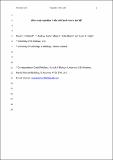Files in this item
Why study cognition in the wild (and how to test it)?
Item metadata
| dc.contributor.author | Pritchard, David James | |
| dc.contributor.author | Hurly, T. Andrew | |
| dc.contributor.author | Tello-Ramos, Maria Cristina | |
| dc.contributor.author | Healy, Susan Denise | |
| dc.date.accessioned | 2017-01-19T00:32:24Z | |
| dc.date.available | 2017-01-19T00:32:24Z | |
| dc.date.issued | 2016-01-18 | |
| dc.identifier | 242239769 | |
| dc.identifier | 96f76e11-ce71-4665-8f31-54d52f405fe9 | |
| dc.identifier | 85011004531 | |
| dc.identifier | 000372993900005 | |
| dc.identifier.citation | Pritchard , D J , Hurly , T A , Tello-Ramos , M C & Healy , S D 2016 , ' Why study cognition in the wild (and how to test it)? ' , Journal of the Experimental Analysis of Behavior , vol. 105 , no. 1 , pp. 41-55 . https://doi.org/10.1002/jeab.195 | en |
| dc.identifier.issn | 1938-3711 | |
| dc.identifier.other | Bibtex: urn:8c7e2e0884643aa92268452083923836 | |
| dc.identifier.other | ORCID: /0000-0002-8059-4480/work/60631271 | |
| dc.identifier.uri | https://hdl.handle.net/10023/10123 | |
| dc.description.abstract | An animal's behavior is affected by its cognitive abilities, which are, in turn, a consequence of the environment in which an animal has evolved and developed. Although behavioral ecologists have been studying animals in their natural environment for several decades, over much the same period animal cognition has been studied almost exclusively in the laboratory. Traditionally, the study of animal cognition has been based on well-established paradigms used to investigate well-defined cognitive processes. This allows identification of what animals can do, but may not, however, always reflect what animals actually do in the wild. As both ecologists and some psychologists increasingly try to explain behaviors observable only in wild animals, we review the different motivations and methodologies used to study cognition in the wild and identify some of the challenges that accompany the combination of a naturalistic approach together with typical psychological testing paradigms. We think that studying animal cognition in the wild is likely to be most productive when the questions addressed correspond to the species’ ecology and when laboratory cognitive tests are appropriately adapted for use in the field. Furthermore, recent methodological and technological advances will likely allow significant expansion of the species and questions that can be addressed in the wild. | |
| dc.format.extent | 15 | |
| dc.format.extent | 494772 | |
| dc.format.extent | 321798 | |
| dc.language.iso | eng | |
| dc.relation.ispartof | Journal of the Experimental Analysis of Behavior | en |
| dc.subject | Field experiments | en |
| dc.subject | Spatial cognition | en |
| dc.subject | Timing | en |
| dc.subject | Comparative cognition | en |
| dc.subject | Behavioral ecology | en |
| dc.subject | Cognitive ecology | en |
| dc.subject | QH301 Biology | en |
| dc.subject.lcc | QH301 | en |
| dc.title | Why study cognition in the wild (and how to test it)? | en |
| dc.type | Journal article | en |
| dc.contributor.institution | University of St Andrews. School of Biology | en |
| dc.contributor.institution | University of St Andrews. Institute of Behavioural and Neural Sciences | en |
| dc.contributor.institution | University of St Andrews. Centre for Social Learning & Cognitive Evolution | en |
| dc.contributor.institution | University of St Andrews. Centre for Biological Diversity | en |
| dc.identifier.doi | 10.1002/jeab.195 | |
| dc.description.status | Peer reviewed | en |
| dc.date.embargoedUntil | 2017-01-18 |
This item appears in the following Collection(s)
Items in the St Andrews Research Repository are protected by copyright, with all rights reserved, unless otherwise indicated.

